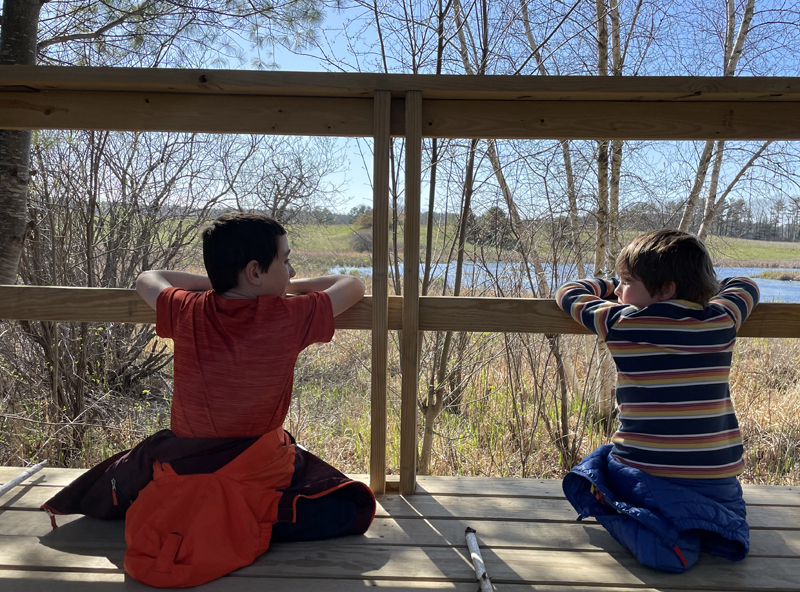
On Taproot Therapeutic Adventures, a program of Bristol-based Hearty Roots, children pause during outings to communicate and reflect, which can include journaling or conversation. The program will expand into additional Lincoln County schools this year. (Photo courtesy Jess Donohoe Ruhlin)
Hearty Roots, a Bristol-based nonprofit offering outdoor adventures and therapeutic tools for children and teenagers, is expanding its offerings into schools this year with Taproot Therapeutic Adventures.
Hearty Roots has offered outdoor adventure programs since 2017, including outing clubs and adventure camps. With Taproot, the organization has formalized the therapy component of its work and plans to expand it.
Taproot outings have begun at Nobleboro Central School and several others are “in the queue,” according to Deputy Director and Adventure Mentor Jess Ruhlin.
“Schools across the Midcoast are experiencing a sharp rise in the number of students in need of direct social-emotional support at all age levels,” NCS Principal Adam Bullard said. “It is clear to me that the work of Hearty Roots … is key to providing individualized (social-emotional learning) programming beyond what we can provide within the walls and halls of our school.”
The one-on-one outings with a mentor and a student are designed to offer more in-depth local resources and were a natural growth of the program, according to staff.
Donohoe said all of Hearty Roots’ programs are designed to be scaffolded, rather than representing steps up or down.
Students can move between group and one-on-one outings as their needs change.

Taproot Therapeutic Adventures, a program of Bristol-based Hearty Roots that has expanded into schools over the last year, takes children on one-on-one weekly meetings like this skiing outing. Deputy Director & Adventure Mentor Jess Ruhlin Donohoe said the program includes an adventure component to encourage mindful movement and active engagement. (Photo courtesy Jess Ruhlin Donohoe)
“It’s an opportunity to meet them where they are,” Donohoe said.
Taproot began in the fall of 2020 as a small group pilot project and expanded in 2021 to multiple sessions. Last fall, the program launched as Taproot Therapeutic Adventures.
“The expansion didn’t change what I do; it just changed how I talk about it,” Donohoe said.
Therapeutic Adventure Mentor Hannah Walsh will receive her social worker license this year, allowing this expansion of the program. Walsh joined Hearty Roots in the summer of 2021.
Donohoe said Taproot’s curriculum was developed from “evidence-based social-emotional learning and trauma-informed youth development approaches.”
Outing structure is unique for each student, according to Walsh, but follows a basic setup of a mindful exercise, an emotional check-in with their mentor, a game or challenge, an outdoor adventure, and a closing check-out.
She said there are different forms each part can take, such as the mindful moments, which might be a deep breath, some yoga moves, or a silent walk.
Taproot programs are structured in eight-week blocks. At the end of each block, the student and mentor choose whether to sign up for another block, add family members or another student, or take a break. Taproot offers six of these blocks in a year.
Donohoe said the program developed as a result of natural conversations about what more could exist in the area and in Hearty Roots’ programming.
According to Donohoe, an early intervention program like Taproot can help to keep a child in their community, rather than being sent elsewhere for treatment if their emotional needs grow.
Donohoe and Walsh said the individual experience with a mentor helps students by providing a trusting relationship and a regular structure.
“Kids really needing a safe adult presence in their lives can find one in the mentorship,” Walsh said.
Donohoe also said children benefit from knowing they have a consistent place to go every week and are settled in a routine they helped to create.
“Hearty Roots programming uses the natural environment around us to help build relationships and ultimately the resiliency needed to thrive in our communities,” Bullard said of the program structure.
Student choice is also a central part of the program.
“It’s rare for kids to have a space entirely for them,” Walsh said, but Taproot students can make choices about what they do during the outing and there is room for discussion.
Walsh said this portion of the program is a part of trauma-informed programming for children, where they can ask for what they need rather than having their voices taken away.
“It’s a process to understand what they need and speak up for it,” she said.
Walsh said they use challenges to practice their emotional skills and learn to reflect.
The program’s core ages are 9- to 12-year-olds, but participants are as young as 6 and as old as 17.
Hearty Roots hopes to identify and build relationships with schools to continue partnering for individual and group programs, Donohoe said. Staff identifies students or groups that could benefit and recommends them to Hearty Roots.
Taproot is offered on a sliding scale and scholarships are available.
As the larger organization continues to grow, Donohoe said future goals include finding a van to offer transportation to students, which can be a barrier for families.
Openings are still available as the program continues to grow in the new year. Donohoe said capacity will increase through the spring.
The program offers payment plans and sliding scales; some school programs will also cover some or all of the cost of Taproot.
For more information or to request a Taproot consultation, go to heartyroots.org/taproot.



